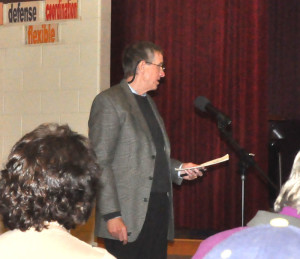One director suggests current teacher proposal could lead to layoffs while union says it’s unfair for teachers to be blamed for HS renovation costs
By Mike McGann, Editor, UnionvilleTimes.com

Unionville school board finance chair Keith Knauss presents his take on the implications of the teacher contract talks, Tuesday night.
PENNSBURY — In the end, it will come down to numbers.
When representatives of the Unionville-Chads Ford School District and its teachers make the case for their respective offers to a state mediator at a non-binding arbitration hearing, Wednesday, both sides will be looking to show why their numbers add up for students and taxpayers. Mariann E. Schick was appointed by the Pennsylvania Labor Relations Board to hear both sides and offer a non-binding compromise by the end of the month.
Both sides offered a bit of a preview of what they expect to highlight during Tuesday night’s Board of Education meeting at Chadds Ford Elementary School, with one school board member suggesting that accepting the teachers’ current proposal could lead to the layoff of 30 or more teachers in the next three years, while the teachers counter that they’ve agreed to concessions on health care costs and shouldn’t be punished for the financial repercussions of funding the high school renovations within normal budget lines after it was rejected by voters twice.
Both sides acknowledge that it’s a difficult problem.
“This is not a situation where one side is rolling in cash,” said board Vice chair Frank Murphy, part of the board’s negotiating team. Murphy said the board was trying to take into account interests of everyone in the community, “the whole ball of wax.”
Although the poor weather kept the crowd in attendance down, board members still heard residents and students express the full range of frustration with the progress of the talks. Michael Walter-Dillion, a third-grader at Chadds Ford Elementary, said he and his fellow students were “sad, worried, scared and a little mad” at how the negotiations have gone and suggested that the adults were not setting a good example for students. The student said he was also worried about the outsourcing discussions for bus drivers, food workers, and custodial and landscaping staff and the idea of bringing “strangers” into his school.
Meanwhile, Harry Miller of Birmingham, a long-time critic of district spending, called on the district to match Chester County and have no tax increase.
Murphy suggested that the board needed to split the fine line between frugal and penny-wise and pound foolish.
“Our job is not to run the cheapest school district we can,” Murphy said. “Our job is to run the most cost-effective school district.”
Keith Knauss, the board’s finance chair, gave a presentation — which he clearly identified as coming from himself, and not necessarily representing the views of the rest of the board of education — that painted a dire financial picture. Knauss ran through numbers that suggested that even with a 3.3% tax increase, the maximum tax increase allowed under the state’s Act 1 limit without a voter referendum, the district would only net an increase in revenue of 1.44%, in part because of drops in property valuation, lower collection rates and loss of other revenues to the district. He said the teachers’ proposal required an additional 3% in salary spending and an additional 2% in benefits. With salaries and benefits making up some 72% of the district’s spending and teacher salaries and benefits making up about 46% of total expenses, Knauss said, it would be virtually impossible to cut elsewhere — bond interest and special education spending cannot be cut under state law, so there’s not a lot of room elsewhere for cuts. Knauss listed seven options, ranging from staff cuts, to a referendum for higher taxes, but said he, and he felt, the rest of board, preferred to reach a settlement with the teachers union.
Still, Knauss said that teachers would have to be willing to work with the board, as the administration and support personnel have, and keep salary increases down if they want to reach a deal.
Pat Clark, president of the Unionville-Chadds Ford Education Association, the teachers’ union, said during the meeting that he and his colleagues also prefer to reach a negotiated settlement, but noted that it was unfair to dump all of the current financial difficulties at the feet of the teachers — and fairness required “a year’s credit be given for a year’s work.” Clark argued that under the teachers’ proposal, less than 2% is being added to the salary matrix, while the union has made concessions on health care costs and agreed to work a longer day.
“I believe we have answered the call for shared sacrifices,” he said.
The district and its teachers have been working for more than year to reach a new contract without success — the previous contract expired in June. The gap between the two sides hasn’t changed dramatically as the talks have progressed, leading to some frustration expressed by parents and students.







Trackbacks